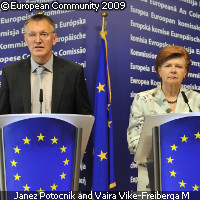ERC review highlights successes but warns that changes are needed
The European Research Council (ERC) has 'succeeded beyond expectations', according to a newly published review of the ERC's structures and mechanisms during its first two years of operation. Nevertheless, the review panel raises serious concerns about the long-term sustainability of the institution, and calls on the Commission to do all it can to adapt its rules and procedures to the ERC's mission of supporting competitive, frontier research in Europe. When the ERC was set up in February 2007, it was agreed that a review of its structures and mechanisms should be carried out in the context of the mid-term evaluation of the Seventh Framework Programme (FP7). The review was carried out by six experts in research policy and management under the leadership of psychology professor and former Latvian president Vaira Vike-Freiberga. Their report is based on discussions with senior people involved in the ERC as well as statements from research organisations and a survey of grant applicants and reviewers. The report highlights the great success of the ERC in attracting both large numbers of grant applications and outstanding scientists from around the world to review them. It attributes the ERC's success to the enthusiasm of the scientific community and to the way the European Commission has respected the academic freedom of the panels evaluating the applications. The panel pays particular tribute to European Science and Research Commissioner Janez Potocnik for setting the tone on this issue. 'These good practices constitute crucial factors that should be preserved in the future,' the report reads. The panel also welcomes the positive impact the ERC has had on national research systems; many countries now use the ERC assessment to allocate national research grants to individuals whose ERC applications met the required quality standards but did not receive an ERC grant because of lack of funds. Given the high demand for ERC funds, the panel recommends that the ERC grow in size and importance in future framework programmes. Nevertheless, the report warns that 'at the most fundamental level there is an incompatibility between the current governance philosophy, administrative rules and practices and the stated goals of the ERC'. It notes that until now, the good will and dedication of those involved in the ERC have compensated for these flaws. However, as the report points out, 'institutions cannot survive only on good will'. The panel is concerned that if these issues are not adequately addressed, 'the initial success of the ERC may decline'. A major problem identified by the team is the 'overly onerous' regulations covering the recruitment and expenses of reviewers, which are discouraging scientists from participation in the ERC's review process. 'The ERC can function properly only if it can mobilise the very best scientists in Europe in order to provide a fair and sound judgement on the submitted proposals,' the panel writes. 'Reviewers are not contractors but valuable volunteers and should be treated as such.' The report also recommends that the members of the ERC's Scientific Council, especially the chair and vice-chairs, should be compensated for their role, and their host institutions should also be paid for administrative support. Furthermore, the management of the ERC should be made up largely of scientists, the report recommends. 'It should not be acceptable today in Europe that non-scientists who have not had the direct experience of conducting successful science enterprises themselves run major European research programmes! This flaw in construction should be urgently remedied,' the report reads. Finally, the panel recommends that a further external evaluation be carried out in two years' time to see if the latest recommendations have been implemented and to determine what further changes might be needed. 'The ERC is of evolving strategic importance to Europe and is already having a substantial positive impact on the European research scene. The sustainability of this success and the aim of building the ERC into a world-class agency depend, however, on adjustments to the operating philosophy and a constancy of the vision that led to its establishment in the first place,' summarised Professor Vike-Freiberga. 'We hope that the Commission will act on our recommendations swiftly, as the ERC presents a novel and essential instrument for European research.' Commissioner Potocnik welcomed the report, saying: 'Although the ERC already can be described as a leader in frontier research funding in Europe, our ambitions must not stop here. The panel's findings will help us to set the direction of our future work to make the ERC a mature and fully effective part of Europe's research system.' The Commission will respond to the report and put forward its proposals on the future of the ERC by October 2009.



